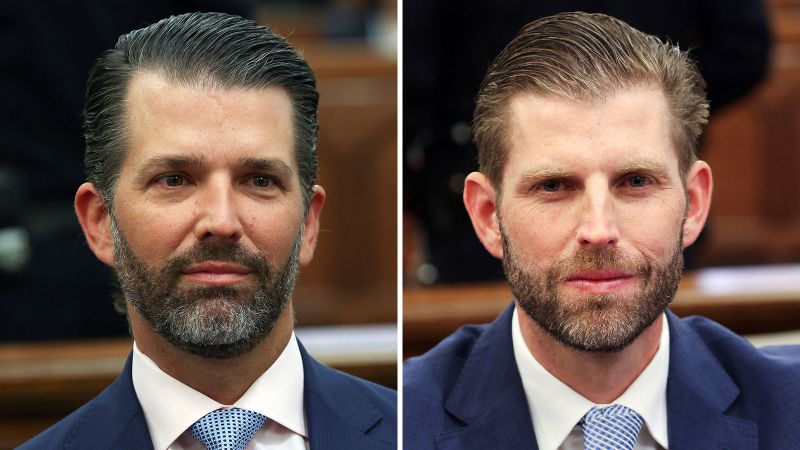The New York Attorney General’s office pressed Donald Trump’s two adult sons Thursday about their knowledge of and involvement with the former president’s financial statements in some of the most significant and tense days of the fraud trial.
The back-to-back appearances Thursday from Donald Trump Jr. and Eric Trump – who both helped run the Trump Organization while their father was in the White House – comes ahead of the former president’s own testimony on Monday.
Donald Trump Jr. and Eric Trump are co-defendants in the case, along with their father, the Trump Org., and several company executives.
The attorney general’s lawyers presented evidence Thursday intended to challenge claims that the brothers were not involved with the former president’s statements of financial condition – which the judge has already ruled fraudulently inflated Donald Trump’s net worth to obtain favorable loan terms.
Here are the key takeaways from the day in court:
Assistant Attorney General Andrew Amer’s examination grew tense as he pressed Eric Trump about his understanding of his father’s financial statements that were used to support real estate transactions and confronted him with a series of emails dating back to 2010.
Eric Trump acknowledged he provided information to former Trump Org. controller Jeff McConney, who is also a co-defendant in the trial. But he tried to distinguish between specific statements of financial condition – his father’s personal financial statements at the heart of the civil case – and general financial records for the company.
“I clearly understand that I sent notes to Jeff McConney. I worked with him almost every day,” Eric Trump said.
“What seems to not be registering is the difference between sending things used for financials and sending things used for a statement of financial condition,” he added. “I don’t think it ever registered that it was for a personal statement of financial condition. It was a detail that was irrelevant to me.”
The distinction is relevant because Donald Trump’s statements of finances are the documents that the attorney general pointed to as evidence that he inflated the values of his properties to boost his net worth – and obtain favorable loan terms.
An expert witness for the attorney general testified Wednesday the Trump Organization saved $168 million thanks to the loan rates obtained with the help of fraudulent information.
The assistant attorney general pressed Eric Trump to concede now at trial, in contrast to some of his answers in a deposition, that he knew at the time of the documented exchanges with McConney that the information he provided about assets like Seven Springs and the Doral Golf Resort were for his father’s financial statements.
Amer showed emails in court Thursday suggesting that Eric Trump was aware of the $45 million value Cushman & Wakefield appraiser David McArdle offered for the Briarcliff Manor development in 2015, which turned out to be $58 million less than what was reported on his father’s financial statements from 2013 to 2018, according to the attorney general’s complaint.
Amer pushed Eric Trump to acknowledge he testified incorrectly in his deposition earlier this year when he said he wasn’t involved in the appraisal process for Briarcliff Manor, pointing to emails and phone calls about it.
After a lengthy exchange, Eric Trump said he stood by his testimony that he had limited involvement.
“That’s not the focus of my day. I focus on construction. I don’t focus on appraisals,” Eric Trump said Thursday.
Earlier in the trial, McConney testified that Eric Trump directed him to make certain decisions that led to the inflated valuations of several Trump properties.
Donald Trump Jr., whose testimony began on Wednesday, repeatedly said that he relied on his accountants and was not involved with the preparations of financial statements for his father, even though he signed them as a trustee of his father’s revocable trust.
As a trustee starting in 2017 once Donald Trump became president, Trump Jr. signed certifications for annual financial submittals required for Trump Organization loans at Deutsche Bank for the Old Post Office, Trump International Hotel and Tower in Chicago, and Doral Golf Resort & Spa in Florida.
He testified that he didn’t draft the financial statements, and when he certified them as a trustee, he relied on the Trump Organization accounting and legal teams that he said would have assured him they were accurate to sign.
The attorney general’s office and Trump’s lawyers got into a lengthy back-and-forth over attorney-client privilege after Faherty asked what steps the Trump Organization had taken once the attorney general’s investigation into the company began in 2019.
Some internal policies and methodologies “have been bolstered” since the investigation began, Trump Jr. said. One of those changes, he said, was hiring a chief financial officer who is a certified public accountant.
The tensest moment of the day wasn’t an exchange between either of the Trump sons and the lawyers – but between the judge and Trump attorney Chris Kise.
Engoron admonished Kise over an offhand comment critical of the judge’s clerk amid an argument about the relevance of Eric Trump invoking his Fifth Amendment rights in an investigatory interview years ago in the case.
Engoron warned Kise about making comments about his clerk, reminding him that he had already put a gag order barring public comment about his staff and threatened to extend the gag order to lawyers, too. Engoron said there could be “a bit of misogyny” in the continued criticism of his female law clerk.
Kise responded that the objections he was making were relevant to the case, and he was allowed to raise concerns about the process of the trial.
“I’m not a misogynist. I’m very happily married, and I have a 17-year-old daughter. I reject that squarely,” Kise said.
The clerk’s role in the case sitting alongside the judge led to Trump attacking her on social media, which prompted Engoron to put the gag order in place. He’s already fined Trump twice for violating it.
Engoron defended his clerk’s role. The notes she passes him during testimony are “confidential communications from my law clerk,” he said, pounding on the bench.
“She’s a civil servant. She’s doing what I ask her to do,” the judge said of his clerk.
Trump takes the stand on Monday
While Eric Trump returns Friday, eyes are already looking towards Monday, when Donald Trump is slated to testify as he continues to attack the trial, the judge and Attorney General Letitia James.
It’s not the first time Trump will be on the stand in the trial: Last month, Engoron called him to testify about a comment he made in the hallway in apparent reference to Engoron’s clerk – and in violation of Engoron’s gag order barring discussion of his staff.
The testimony could also offer a preview of sorts to how Trump might react in the four criminal trials – in New York, Washington, Florida and Georgia – which are looming in 2024 at the same time as Trump prepares to challenge President Joe Biden for the White House.
Trump has attended the civil trial at several points to observe, though he was not present for his sons’ testimony. But that didn’t stop him from weighing in on his social media while they were on the stand.
“So sad to see my sons being PERSECUTED in a political Witch Hunt by this out of control, publicity seeking, New York State Judge, on a case that should have NEVER been brought. Legal Scholars Scream Disgrace!” Trump posted on Truth Social.
Read the full article here





